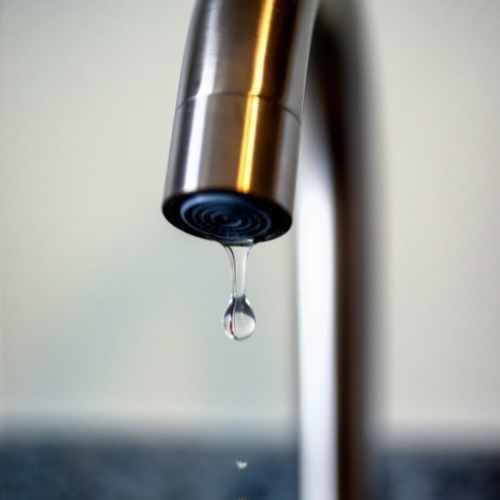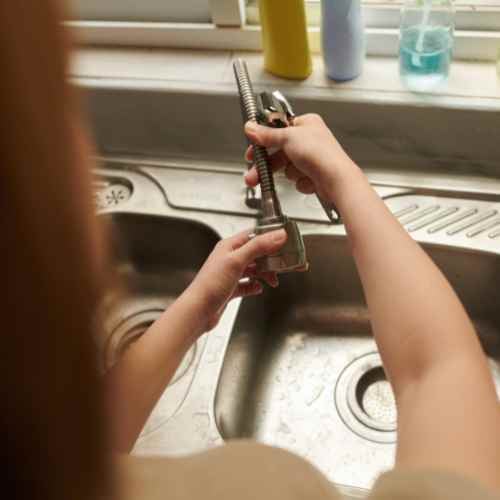A leaky kitchen faucet is more than just an annoyance – it can waste thousands of gallons of water per year, leading to higher water bills. While some faucet leaks are easy to fix, others require professional help. Let's explore common causes of kitchen faucet leaks, simple DIY solutions, and when to call a plumber. Common Causes of Leaky Kitchen Faucets
- Kitchen faucet leaks often stem from worn-out or damaged components: Worn O-rings or washers.
- Corroded valve seats
- Loose parts
- Mineral buildup
- Damaged cartridges
DIY Fixes for Minor Leaks
Try these DIY solutions for simple leaks:
Tighten connections: Check for loose parts and tighten them with a wrench.
Replace O-rings or washers: These inexpensive parts often wear out and cause leaks. Turn off the water supply, disassemble the faucet, and replace the worn components.
Clean the aerator: Mineral deposits can clog the aerator, causing leaks. Unscrew it, clean it thoroughly, and reattach it.
Address mineral buildup: Soak affected parts in vinegar to remove mineral deposits.
Before calling a plumber, consider tackling simple leaks yourself. Start by examining your faucet for loose connections. A quick tightening with a wrench might be needed to stop the drip. If tightening doesn't do the trick, replace worn O-rings or washers. This job requires turning off the water supply and disassembling the faucet. Still, it's a manageable task for many homeowners with patience and the right tools.
Don't overlook the humble aerator—that small screen at the faucet's tip. Mineral deposits can clog it, causing irregular water flow and potential leaks. Unscrewing, cleaning, and reattaching the aerator can often resolve these issues. For stubborn mineral buildup elsewhere in the faucet, try soaking affected parts in vinegar. This natural solution can dissolve deposits and restore proper function.

When to Call a Plumber
While many faucet leaks are DIY-friendly, some situations warrant professional help:
- Persistent leaks: If your DIY efforts don't stop the leak, a plumber can diagnose and fix the underlying issue.
- Complex faucet types: Some modern faucets have intricate designs that require specialized knowledge to repair.
- Water pressure issues: A plumber should assess your home's plumbing system to see if the leak is related to water pressure problems.
- Visible damage: Cracks in the faucet body or severe corrosion may require a complete replacement, which a professional best handles.
- Multiple leaks: Any leaks in various locations could indicate a more serious plumbing problem.
- Lack of tools or confidence: If you need help tackling the repair or the necessary tools, it's best to call a plumber to avoid causing further damage.

While DIY solutions can address many common faucet issues, some require professional expertise. If your best efforts fail to stop a persistent leak, it's time to consult a plumber. They have the tools and knowledge to diagnose and fix underlying issues that might not be apparent to the untrained eye.
Modern faucets, with their sleek designs and advanced features, can be particularly challenging to repair. Their intricate mechanisms often require specialized tools and knowledge. If you're dealing with a high-end or complex faucet, calling a professional can save you time, frustration, and potential damage to an expensive fixture.
Water pressure issues can sometimes manifest as faucet leaks. If you notice inconsistent water pressure along with your leak, it could indicate a more systemic problem in your home's plumbing. A professional plumber can assess your system to identify and address the root cause.
Visible damage to your faucet, such as cracks in the body or severe corrosion, often signals the need for a total replacement. While replacing a faucet might seem straightforward, ensuring proper installation and connection to your home's plumbing system is crucial to prevent future leaks and water damage.
If you find yourself dealing with multiple leaks throughout your kitchen or house, it's a red flag that shouldn't be ignored. Multiple leaks could indicate more serious plumbing issues that require professional attention.
Lastly, always appreciate the value of your comfort and confidence. Suppose you feel unsure about tackling a repair or don't have the necessary tools. In that case, it's always better to call a professional. Attempting repairs beyond your skill level can lead to more damage and potentially costly repairs.
Remember, promptly addressing a leaky faucet can save water, prevent damage, and reduce water bills. Whether you choose to DIY or call a professional plumber, taking action is critical to maintaining a functional and efficient kitchen sink.


